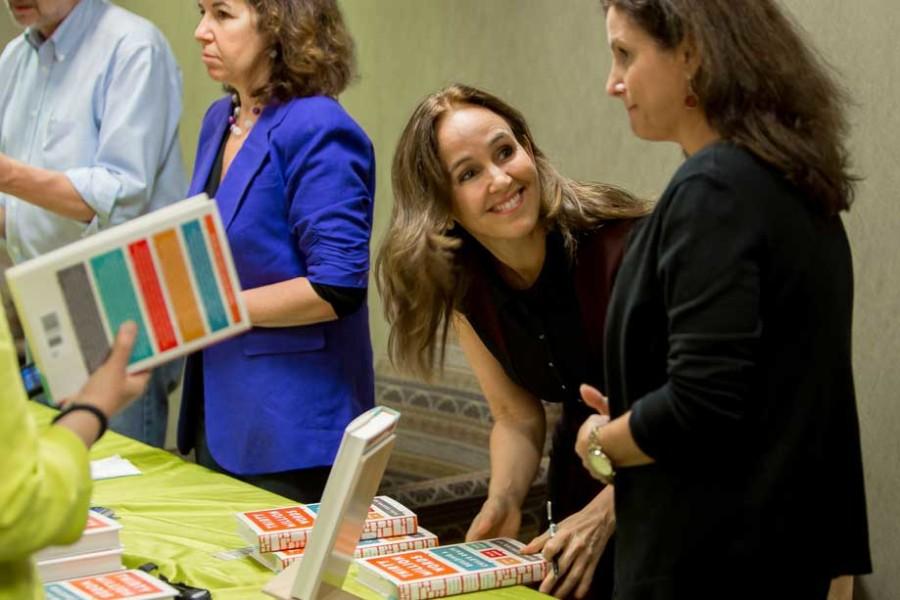Pediatric surgeon pushes parent-child interaction to enhance language development
Zack Laurence/The Daily Northwestern
Dr. Dana Suskind, a pediatric surgeon, spoke Thursday evening at Rotary International World Headquarters about the importance of parent-child verbal communication to language development. Suskind started educational programming based at the University of Chicago to help children in low-income families develop at a similar pace as children in wealthier families.
September 24, 2015
A pediatric surgeon spoke Thursday evening at Rotary International World Headquarters about how children’s socioeconomic status affects language and brain development.
Dr. Dana Suskind, an author and professor of surgery at the University of Chicago, told an audience of more than 100 in the auditorium at 1560 Sherman Ave. about two young patients — one whose family has a stable income and the other born into poverty — and their varying experiences with deafness. In her practice, Suskind uses cochlear implants to improve her patients’ hearing.
“A cochlear implant is an incredible device to allow a child born deaf to meld into this world both educationally and socially,” Suskind said. “But it wasn’t long until I realized this device came with a very large asterisk.”
Suskind defines this caveat as a child’s environment and the stressors to which they are exposed. A child born into poverty will have heard on average 30 million fewer words by age three than a child from a professional family, Suskind said.
The surgeon said she founded the Thirty Million Words Initiative, an educational program at UChicago, to find an empirical way to teach low-income families about the power of language in brain development.
“We are not talking about a difference of love in parents,” Suskind said. “Families without stable child care must be supported so they can invest in their homes.”
Thirty Million Words aims to help with this investment through home visits, which lie at the crux of its program, Suskind said. Specialists work with parents to communicate the science of language and brain development and how powerful their influences are in shaping a child’s learning trajectory, she said. A feature of the program is making a list of goals with the parents.
“The foundation of our program has less to do with language than the idea of intelligence as a malleable factor,” Suskind said. “We help parents understand that babies aren’t born smart — they are made smart.”
Suskind acknowledged convincing individuals of this science is difficult.
Keith Johnson, an Evanston resident with a masters degree in human development who attended the event, said he was at first perplexed about why something so natural as parent-child interaction needed to be taught. He said Suskind allowed him to see the importance in environmental stressors that might make interaction difficult between parent and child.
Suskind said an equal partnership between parents and researchers is crucial in reducing the impact of poverty on a child’s brain development. She said she strives to make programming low-cost and efficient, which led her to integrate the curriculum in hospitals and pediatricians’ offices. The Well Baby Program is one such project where a child’s immunization appointments are used as opportunities to encourage verbal communication between parent and child.
“What’s inspiring is, at a core level, this is a low cost initiative,” audience member Stephanie Rosa said. “Every person without expensive resources can effectively help their child.”
Ultimately, these strategies must be partnered with larger changes at a macro level, in which poverty is not stigmatized and programs are implemented on a level that can produce a population-wide change, Suskind said.
“We need policymakers to hear this,” Suskind said. “When we advocate in parent-talk, we must also advocate for the parents.”
Email: [email protected]
Twitter: @elenasucharetza


